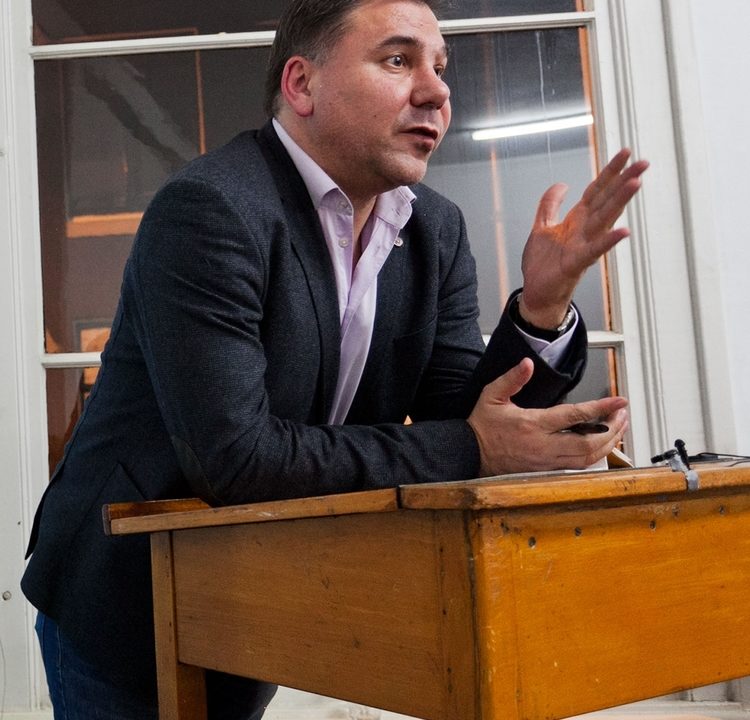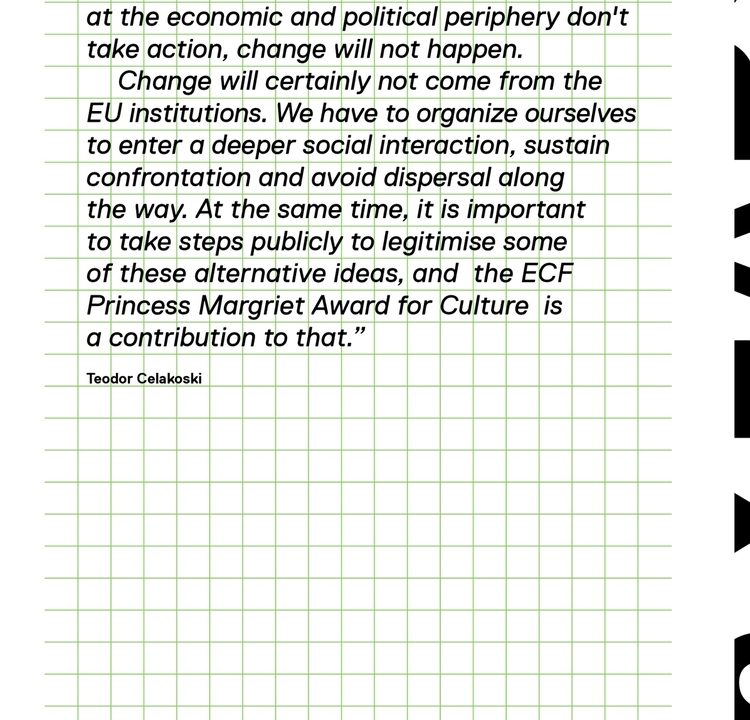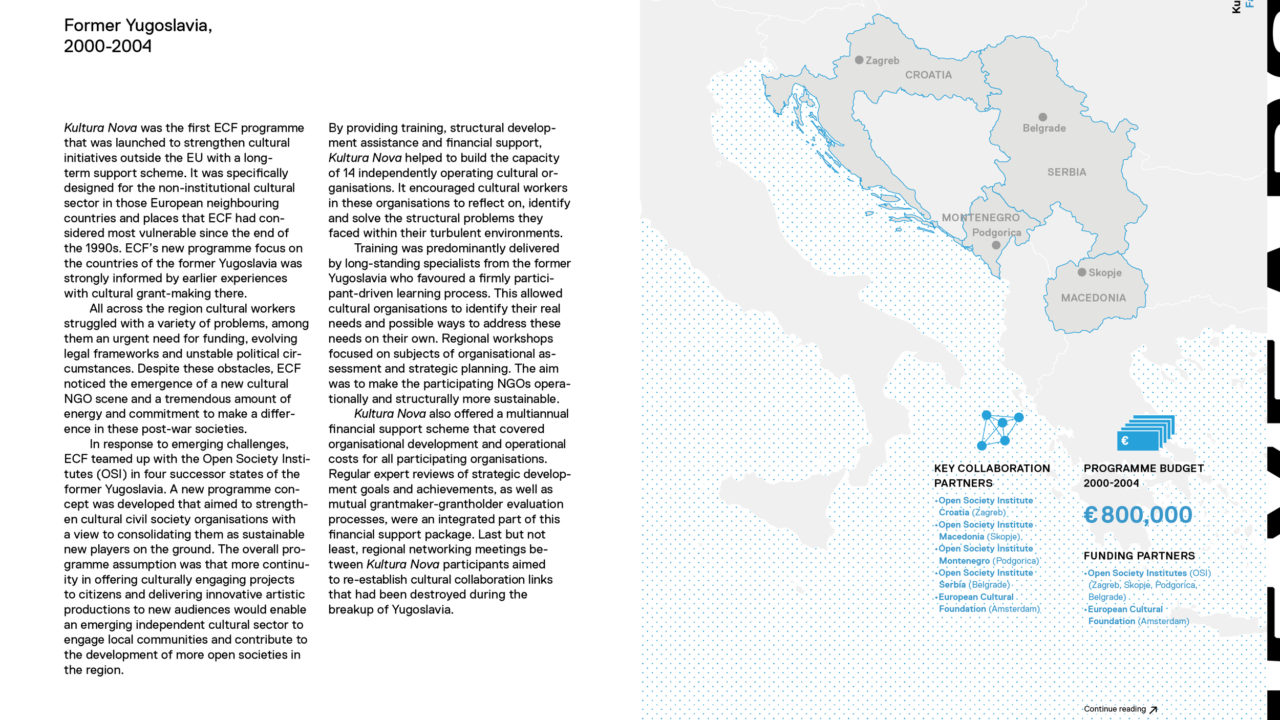Ivan Krastev in conversation with Philipp Dietachmair – Part 5
20 Feb 2016
Read Part 1: Looking Back; Part 2: Identity Politics, Part 3: A Common Ground Across Geographies and Part 4: Finding a New Language. A print-friendly version of the complete conversation is available for download (PDF).
15 Years in the Neighbourhood Ivan Krastev in conversation with Philipp Dietachmair
We are coming to the end of our conversation with Ivan Krastev in this final chapter of our five-part interview we conducted in Vienna a few weeks ago. After we looked back at what the past 15 years have meant for the building of democratic European communities in part 1, we dove into the issues around the real division between people within our societies across the continent in part 2, then we looked at concrete examples of this division in part 3 and explored the possibilities of finding a new language in part 4.
We now discuss civil society initiatives across the continent, the risks some cultural actors face in their local environments, and we conclude our talk by evaluating the role of cultural institutions in the current political context of Europe and its neighbourhood.
We also invite our readers to join the dedicated ‘Another Europe’ Lab on ECF Labs where you can participate to the discussion on issues around these particular themes and download more texts on our work in the EU Neighbourhood as featured in our most recent publication Another Europe.

PART 5 – Culture and Politics
Let us briefly look back to the beginning of this conversation, when we discussed about the starting point of our programmes end of the 90s and the very different political context back then. What can we expect for the next 15 years? You already spoke about the new transformative power of the situation in the EU Neighbourhood which, as it were, forces itself upon Europe. During a European Cultural Foundation event called the Dwarfing of Europe in 2013, political analyst Ranabir Samaddar of the Calcutta Research Group tried to describe the EU and its Neighbourhood with an image of two concentric circles: the inner circle (the EU), he said, would inevitably come into motion once the outer circle (the neighbouring countries) started moving. It seems that we have arrived at exactly such a situation. Do we have to anticipate that during the next 15 years our collaboration with cultural initiatives outside but also inside the EU will be determined by a more and more unpredictable and in some fields even dangerous context?
Until now we have been looking at ourselves as transformers in a certain way. Cultural managers and the cultural policies of the European Union and its countries have been acting as if they were in a classical science-fiction story, in which they are going to an alien planet and transform the people there. We now understand that first, by transforming them you are changing yourself. But then, the people that you are transforming also have an idea how to make you different. The European Union in the way we knew it is not here anymore. It is going to become something else. But it doesn’t mean that there is not going to be a European Union, only that everything is going to be different. So, it’s not about having found right or wrong answers to the questions we had fifteen years ago, the questions as such are changing. From this point of view, the success of any cultural programme for me is determined by coming up with the right questions.
We shouldn’t fall into the trap of believing that by insisting on doing what we have always been doing we show consistency and commitment. No, I do believe that the cultural sphere, like anything else, has to be flexible and needs to be ready for change. Programmes and support schemes that made a lot of sense five years ago can turn out not be working anymore, simply because the context has changed. We will need to re-evaluate and ask ourselves a new question: this question is not about having done things in a good or bad way, but asking ourselves what do we need to do in order to have most impact in the situation we face today?
This is going to be much more difficult compared to fifteen years ago, because the assumptions of what needs to be done were widely shared back then. Today, we are in a situation where we are going to see societies, political establishments and institutions which will face the challenge of having very different assumptions about what’s actually going on. How will the world look like in ten years from now? Today, one gets very different answers, depending on whom we ask.

You have already touched upon the power cultural projects can develop for engaging people around certain issues, the mobilising role culture can have for civil society movements and the involvement of cultural initiatives we see today with protest movements inside and outside Europe. In Zagreb, some of the first cultural initiatives we have started to collaborate with in our capacity building programmes fifteen years ago, have since become – among doing many other things – the coordinators of a powerful activists’ platform. They team up with environmentalist groups, civil rights groups, independent media and even unions to protest for example against the construction of a shopping mall and an underground garage in an inner-city pedestrian zone, but also other government-led privatisation projects, such as selling of the usage licenses for Croatia’s highways, etc. You published a book (Democracy Disrupted: The Politics of Global Protest, Philadelphia: University of Pennsylvania Press, 2014) which deals with the recent protest movements around the world. Many of them have expressed their demands in a very imaginative and creative way. From your point of view, what is the particular role culture and cultural initiatives played within these protests of the past few years?
They are indeed very creative and that’s very important. Cultural practices are crucial for generating identity in such moments. We saw this happening with the protests in Bulgaria and the Gezi Park protests in Turkey, when people suddenly became highly imaginative. Artists play a very important role in this from the beginning, as their work can contribute creative and symbolic propositions as to what the major challenge at hand actually is. Around this, these groups can then crystallise certain energies.
Once such constellations grow strong enough to create specific identities however, it is very important to see how they are actually going to institutionalise. Because what bothered me then, and still does now, is that some of my initial fears have turned out to be legitimate when we look at the actual legacy of the Gezi protests, or the Bulgarian protests, or the Russian protests in 2012. Most important in the long run is what one makes of this creative energy that people have while on the square. The protest-driven constellations that are going to survive – in the sense that they truly represent citizens who act together – are the ones that manage to motivate people to enter politics or to defend their ideas at least by really doing things, such as creating a new theatre or establishing a new organisation.
I believe that part of the political weakness of some of the milieus close to culture is their tendency to underestimate the power of institutions. We can speak of a total cult of creativity as an end in itself, which is coupled with the idea that it is already enough to disrupt, that the idea of culture is enough to disrupt. But it is not enough. Unfortunately, change in our societies does not happen in the same way as it tends to happen in technological companies. I think it is not a coincidence that artists and people in IT are often overrepresented in many of the protests that you see around the world today. IT people know that disruption normally works well in their technology companies. But in societies, it is very important to bring in others, to allow certain ideas to multiply, to allow certain cultural practices and even fashions to spread, because part of the power of cultural practices is that they also work as a fashion: Something that was strange yesterday is becoming trendy today and is going to become a new norm tomorrow. So, how to learn, how to institutionalise, how to go outside of your own circles? And then, what is even more important: how to learn to speak by not just telling your own story, but actually the story of the people you don’t know of yet?
For me, it was a very strong signal in this direction that Svetlana Alexievich received the Nobel Prize for literature. Because to be the voice of other voices is crucially important in culture, as it allows society to hear itself – as all classical literature did. I do believe that there is a very strong anti-political sentiment among some of the cultural circles we work with, the idea that politics is not a good place for decent people. But it is very difficult and contradictory to believe that politics in general is not a place for decent people while expecting on the other hand that only decent attitudes should prevail inside the political system. So from this point of view, I do believe that often there is actually no need for a regime change but for a change of mind.
Some of the cultural initiatives from Zagreb I have introduced when we spoke about the recent protest movements, have for example established a new service organisation for the support of independent cultural productions in the city. One of the main goals of this organisation is the development of venues for contemporary cultural creations and events – e.g. in abandoned factory buildings owned by the city. Both the City of Zagreb and a coalition of local cultural NGOs which have set it up govern the organisation in the legal framework of what they call a ‘civil – public partnership’. This seems to be a good example for people who have moved on from protesting to ‘really doing something to defend their ideas’ as you argued for. But what’s the next step now? Should they enter politics and become a political party?
They don’t need to right away become a political party, but those of them who see that they have the talent to create change by mobilising people could choose that way. Many important cultural figures and dissidents across Central and Eastern Europe went into politics in the early 1990s. They didn’t stay for a long time, but they made a lot of changes and one of the most important things they changed was language and how to talk about certain things differently. There is no need to push people to go into politics if they really don’t want to go there. But to make a virtue out of being anti-political and outside of the political sphere even when you very much care about politics, is in my view one of the weaknesses of this cultural milieu. And this is very much limiting their power to really change their own societies.
And what to do in situations where sometimes it can even be too dangerous to publicly appear as a politically engaged cultural figure, like in Egypt or in Belarus?
This is awful. We know the existence of this danger very well from the communist period. Governments are trying to put pressure on people who just want to speak freely. But because of this risk, the public sometimes also listens differently to those who dare to speak freely and take these risks. It is very easy to be nonconformist in an environment that doesn’t care about you. It is very easy to attack God in a post-catholic secular France, whereas it is very, very risky to do so in most Muslim societies today. But actually because of this, we are also not listening very carefully to those who do blame God in France.
However, when we encounter dissident voices under threat, get to know how profound it must be for the person who dares to speak, how significant it is for this person to take the risk, the poet, the artist gains rising importance exactly as a result of this willingness to be exposed. This is the paradoxical story of dictatorship: the harder they repress, the more important they are making the figure of the artist. But we cannot push people to take risks that they are not ready to take. I find it morally unacceptable when somebody from outside pushes people to take the risk when they are not sharing that same risk. However, we need to make sure people who are ready to take these risks are heard.

Part of our work at the European Cultural Foundation is to translate know-how from our programmes in the EU Neighbourhood and the practices of the cultural initiatives we collaborate with for consideration in broader EU policy agendas. The External Action Service of the EU will soon announce a new cultural component to be included in their EU Foreign Relations policy framework. the European Cultural Foundation’s advocacy work in the framework of the More Europe consortium has helped to introduce some of the key aspects we just discussed towards a new way of thinking about European cultural collaboration on EU foreign policy levels. In international diplomacy one of the challenges is of course that it still happens mostly based on government to government relations. From your point of view, what should be key aspects of future EU diplomacy programmes that are based on the soft power of culture?
I believe that culture is something more than simply the soft power, something which is simply based on the power to attract. That’s why also in the context of international diplomatic relations, when institutional cooperation has its limits, it is very important to also go on the level of individual encounters, through scholarships, trips and visits. Because at the end of the day, it is all about people. People to people. Instead of trying to always go into very long term institutional programmes where governments are going to agree on something that is meaningless, that nobody is going to hear about, people with ideas should be at the centre of everything.
The European Union could use its money to provide thousands of fellowships for young people to see how our cultural institutions work. Give money to European artists to go and learn on the spot, to see what it is like to live in some of the countries we talked about. These types of very simple projects can have much more impact than something that works very good on paper but at the end of the day, is going to get entangled in intragovernmental relations where some of the money, while hopefully not being stolen, might nevertheless be wasted on programmes whose only feature is that they are not offensive to anybody. If you don’t have a partner that is really interested in transformation, and if you don’t want to fake cooperation, go with small grants and give support to as many different people as possible.
We’ll pass it on! Thank you very much for this conversation.
